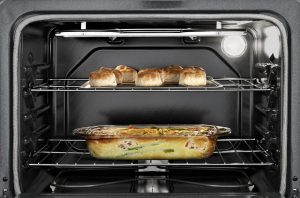The Handle
Consider the number of times that you open and close your range in an average week. Now ask yourself whether your hands were clean every time you touched the handle. The chances are that you opened up the oven when you were preparing a meal, so you’re likely to have had food on your hands. Unfortunately, these traces of food can encourage the growth of germs and bacteria.
Door handles tend to hold more germs than other surfaces, and if they are not correctly washed, you could end up with colonies of bacteria. So, be sure to clean off your oven handle after every use to save spreading germs throughout your kitchen.
The Racks
Your oven racks are exposed to intense amounts of heat, but this doesn’t mean that they are sanitized. Your racks are likely to be covered with baked on food residue, which will need some care and attention to remove. Approximately every month allow your racks to soak in a sink full of hot, soapy water for at least 30 minutes. If your sink is not large enough to fit your racks, fill an empty bin or container with hot, soapy water.
After soaking, you should be able to wash off any grime using a cloth. If there are any stubborn spots, you don’t need to resort to harsh chemicals. You can use baking soda and water to make a paste that can be used to eliminate any remaining gunk.
The Grates
Just like your oven racks, the grates on gas cooktops need some care and attention to avoid bacterial growth. Simply lifting the grates and wiping underneath will not fix the issue; they need a thorough cleaning to remove any baked on grime and gunk. Fortunately, your grates can be treated in the same way as your oven racks with soaking. Use hot, soapy water and allow the grates to soak to loosen any debris. Just be sure to ensure that the grates are dried completely before you try to reassemble your cooktop.
The Floor
While you may be diligent about keeping your kitchen floor clean, have you actually looked under your range? Under a range tends to be where any escaped food escapes and this can attract some unwelcome things. Even if you are very careful as you cook, crumbs and other debris is still likely to accumulate under the range. So, it is crucial to look under your range and ensure that everything is cleaned up. You can either pull the range out to clean under it or use a thin duster that can be pushed underneath to clear any debris.
If you’ve given your range a good clean and it is still not operating as it should, it may be time to call in a professional appliance repair specialist. An experienced technician can assess your range to check for damaged or worn components that could be compromising performance, safety, and efficiency. This will allow you to have complete confidence that your range can continue to prepare all of your family favorites in the years to come.
